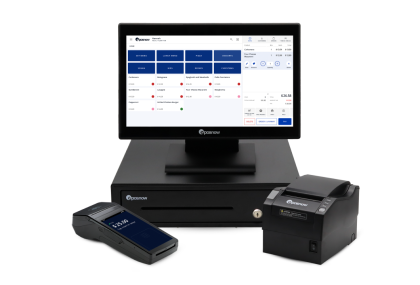Where is Data Stored in an EPOS System?
Data. It's what makes the world go round. It's what helps businesses make decisions, understand their customers, and improve their bottom line.
As a retail or hospitality business owner, you know that data is important. You also know that choosing the right electronic point of sale system (EPOS) is critical to managing your data effectively.
But what you may not know is what you can do with your data once it's collected. And more importantly, where is that data stored?
In this blog post, we'll answer those questions and more, so you can feel confident that your EPOS system is working for you - and not against you.
Epos Data Definition?
Data is simply information that can be used to make decisions. In business, data can be used to understand what customers want, what they're buying, and how much they're spending.
This information can then improve the customer experience, drive sales, and boost profits. For example, say you own a boutique clothing store. Inventory management data can help you see which items are sold and when they're selling best. You could then adjust your inventory accordingly.
This data-driven decision-making can help you stay one step ahead of the competition and keep your customers happy.
How is data collected?
In most cases, data is collected automatically by EPOS systems. Every time a customer makes a purchase, information about that transaction is recorded and stored. This might include the items purchased, the date and time of the purchase, and the amount spent.
Some EPOS systems allow you to export detailed functional reports in real time. These reports can be used to further understand what's happening in your business. You might, for example, want to track which products are selling the most in your restaurant or which employees are processing the most sales. This information can be extremely valuable in helping you make decisions about running your business more effectively.
Everything in one package
Our EPOS system enables you to adapt, gain new customers, increase profit and remain future-proof.
- Set up, onboard and train staff in minutes
- Online, delivery, collection and multi-channel ready
- Access your business insights through any device, on-the-go
- Real-time reporting on staff, customers, sales, margin and stock
- Use standalone, or connect to hundreds of apps including payment systems, accounting software and much more

Where is data stored?
This is very much dependent on the type of EPOS system you have. In some cases, data may be stored locally on a computer or server. This is often the case with older, legacy systems. However, more modern cloud-based EPOS systems store data remotely in the cloud.
This has a number of advantages, including:
Reduced risk of data loss
If something happens to your local computer or server, your data may be lost forever. Storing data in the cloud means that it can be easily backed up and accessed from anywhere in the world with an internet connection. For example, if your computer crashes, you can simply log in to your cloud based EPOS system and carry on as normal. Or, if you need to view your sales data while you're out of the office, you can do so using a mobile app or web browser.
Improved security
Cloud-based systems often offer improved security features, such as encryption and two-factor authentication. This helps to protect your data from being accessed by unauthorized individuals.
Flexibility and scalability
Cloud-based EPOS systems are usually more flexible and scalable than their on-premises counterparts. This means that they can easily be adapted to suit the changing needs of your business. For example, if you need to add new users or increase your storage capacity, this can usually be done without any major disruptions.
What are the benefits of storing data?
There are many benefits to storing data, including:
Improved decision making
Data can be used to help you make more informed decisions about your business. By analyzing sales data, for example, you might notice that certain products are selling well at certain times of the year. This could be used to help you plan your stock levels and adjust your pricing accordingly.
Better customer service
By understanding what your customers want and need, you can provide them with a better shopping experience. For example, if you know that certain items are popular among your customers, you can make sure that they are always in stock. This, in turn, can help increase sales and customer loyalty.
Increased efficiency
Data can be used to streamline your business operations and make them more efficient. For example, if you know that certain products are selling well, you might want to increase production or stock levels accordingly. Or, if you know that certain employees are processing a lot of sales, you might want to consider giving them a bonus or promotion.
What are the risks of storing data?
There are some risks associated with storing data, including:
Data breaches
If your data is stored remotely, it may be more vulnerable to attack. However, cloud-based EPOS systems usually have robust security features in place to prevent data breaches. To mitigate this risk, it's important to choose a reputable and reliable EPOS provider.
Data loss
There is always a risk that data could be lost, either through human error or technical problems. To protect against this, it's important to have a robust backup and recovery system in place. Cloud-based EPOS systems usually offer this as standard.
Final Thoughts
Data is an important part of any business, and EPOS systems are no exception. It's important to understand where your data is stored and what risks are associated with storing it. Doing so can ensure that your data is properly protected and maximize the benefits it can bring to your business.
Want to know how Epos Now can help your business? Get in touch with our team today to find out more.
